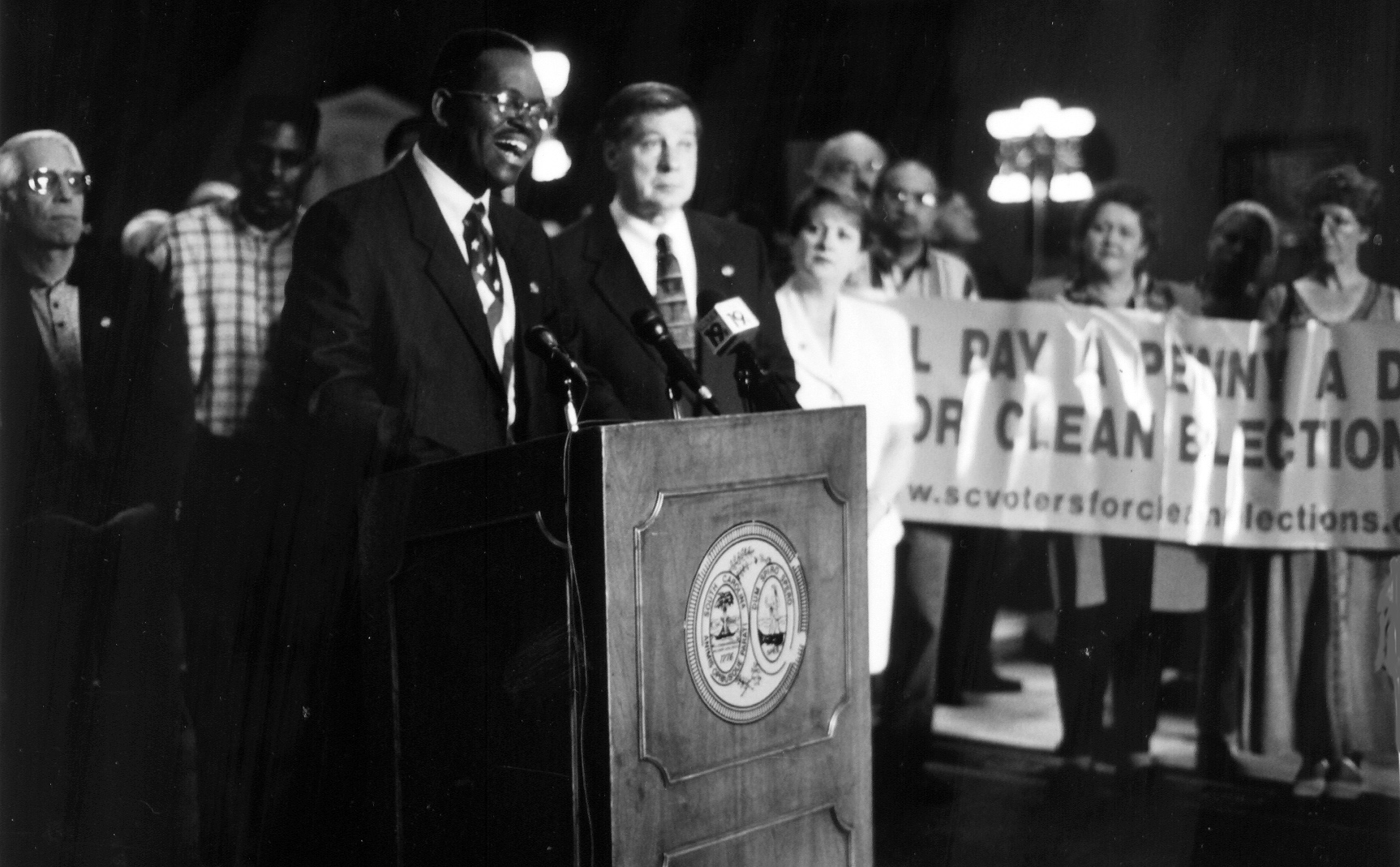The SC Progressive Legislative Caucus has introduced four bills prepared by the SC Progressive Network’s Research and Policy Institute to reduce the corrupting influence of money in state policies.
The timing of this legislative package is critical, as South Carolina’s ethics scandals stretch into an election year. With public appetite for cleaning house at a record high, the Network is prepared to advance common-sense bills for reforms to make government more transparent and accountable.
Special election restitution
H-4502 would make politicians removed from office due to a criminal conviction pay for the special elections to replace them. Progressive Caucus member Sen. Mike Fanning (D-Fairfield) filed (S-533) bill in the Senate during the last session. (Watch a clip of him explaining the legislation.) Caucus Chair Rep. Gilda Cobb-Hunter, the bill’s primary House sponsor, says that the flood of campaign cash to legislators who face no opposition has contributed to corruption.
Each special election to replace incumbent legislators removed from office due to a conviction costs taxpayers around $120,000 for a House seat; and $180,000 for a Senate seat. The state only pays for 40% of the cost, leaving counties paying the balance out of their underfunded budgets. To replace convicted attorneys general or other constitutional officers costs about $30,000 if a special session of the legislature is called.
 The late Sen. Clementa Pinckney speaks at a press conference to promote the Network-backed bill he sponsored for clean elections (also called publicly financed elections). While it has been introduced year after year, the provision may now get traction as a bill to allow public financing for attorney general races.
The late Sen. Clementa Pinckney speaks at a press conference to promote the Network-backed bill he sponsored for clean elections (also called publicly financed elections). While it has been introduced year after year, the provision may now get traction as a bill to allow public financing for attorney general races.
Public financing of candidates for SC attorney general
As South Carolina’s corruption scandal widens, the time is ripe to renew our call for publicly financed elections, beginning with the attorney general. H-4499 calls for giving qualified candidates for attorney general who refuse all private donations a publicly financed grant to run for office.
State Attorney General Alan Wilson took maximum campaign contributions in his last race from both the McNair firm and SCANA. He took more than $500,000 from lawyers and off-duty lobbyists in his last three campaigns. After his 2014 campaign, Wilson returned $3,500 to former House Speaker Bobby Harrell after Harrell was indicted, and Wilson had to refund about $50,000 in donations that exceeded contribution limits.
Public financing would allow candidates to run for attorney general without taking any campaign contributions from individuals or corporations that may later need to be investigated or indicted. In 2001, then Republican Party Chairman Henry McMaster understood the problems inherent in allowing the state’s top law enforcement officer to rely on private cash to run for office. McMaster told Gov. Hodge’s Campaign Finance Reform Commission that the race for attorney general is the one elected office that should be publicly financed.
Banning campaign donations by regulated utilities
4501 would prohibit regulated utilities from making campaign contributions to the candidates and politicians who are responsible for regulating them. An example is the 2007 legislation that allowed SCE&G to charge ratepayers in advance for nuclear reactors that have since been abandoned.
“The power company paid former Gov. McNair’s law firm to write the bill,” Cobb-Hunter said. Then both the utility and the law firm made $60,000 of strategic, bipartisan donations to legislators. “They even gave me a donation,” she said. The bill passed both bodies without a public hearing or debate. The Senate didn’t even take a roll call vote.
Public transparency and accounting fee for campaign donations
H-4500 would place a small fee on all campaign contributions that would fund an automated public disclosure system and generate money for attorney general candidates who want to opt into a publicly financed campaign.
The State Ethics Commission is woefully underfunded, short-staffed, and has a public disclosure web site that is opaque. Furthermore, candidates make unintentional mistakes – as well as intentional – in filing. We’ve crafted a low-cost, high-tech solution to multiple problems.

Thanks so much for sharing info on these bills. Will you also be tracking or working on Senate bill 341 which seeks to address partisan gerrymandering through the establishment of an independent redistricting commission. I believe that another bill is being introduced to establish criteria for drawing voting district lines
Error in my above message. Senate bill 341 is a carryover from last year. The new legislation dealing with the establishment of an independent redistricting commission is H4456.
thanks